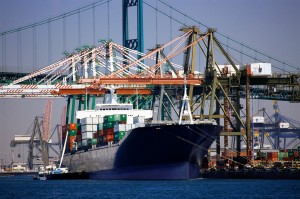By Paul DiVecchio, U.S. Export Compliance Expert
 Paul DiVecchio (photo) is a nationally renowned expert on U.S. export compliance, and has assisted numerous companies with developing compliance programs and resolving violations with the federal government. Paul is the founder and managing director of DiVecchio & Associates.
Paul DiVecchio (photo) is a nationally renowned expert on U.S. export compliance, and has assisted numerous companies with developing compliance programs and resolving violations with the federal government. Paul is the founder and managing director of DiVecchio & Associates.
 If your company ships even one order overseas, it is critically important that you put the right safeguards and procedures in place to ensure rigorous compliance with U.S. Export Controls regulations. An export compliance program will ensure your company doesn’t unintentionally ship a product that requires a license to export, or accidentally supply products to a barred entity.
If your company ships even one order overseas, it is critically important that you put the right safeguards and procedures in place to ensure rigorous compliance with U.S. Export Controls regulations. An export compliance program will ensure your company doesn’t unintentionally ship a product that requires a license to export, or accidentally supply products to a barred entity.
Today, regulatory export compliance is more important than ever for U.S. national security. And…the government is increasingly holding individuals – not just their companies – accountable for violations. Regulations are in place to ensure that U.S.-manufactured dual-use commodities, software, and technology (products that have been designed for commercial use, but may also have military applications) do not end up in the hands of unauthorized countries, companies, organizations and/or individuals, or for end-use applications that are detrimental to U.S. national security. It is important to note that export regulations apply to ALL exporters, not just exporters of classified “dual-use” commodities. Consider the following export compliance violations:
- A nutritional supplement manufacturer (note, not a dual-use commodity) was assessed a $45,000 fine and given a 1 year probation (further violations will result in a denial of export privileges) for shipping “whey nutrition supplements” to Iran via the UAE. Furthermore, the co-owner of this company was assessed a personal $22,000 fine for making false statements during the investigation.
- A large electronics company was fined $1.73 M for exporting products that were controlled for national security reasons to Cuba without the proper Department of Commerce Licenses.
- A large materials company was assessed a $275,000 fine for shipping a product that is controlled for nuclear non-proliferation reasons to Libya through Canada without the proper Department of Commerce licenses.
Other consequences include:
- Substantial additional fines: administrative penalties for the late payment of export compliance fines commence at $250,000 per charge
- Negative publicity: by federal law, all settled export enforcement cases must be published
- Disruption of business: tying up company resources
- Legal costs: to extricate the company from penalties
How to Get Started with an Export Compliance Program
The return on investment (ROI) of a “best-in-class” global export compliance program is hard to pin-point as you are dealing with intangibles. The best way to justify the investment is to think about it as a company insurance policy to minimize exposure to the serious risks listed above.
Mistake avoidance is the key to export compliance. Mistakes are extremely time-consuming to reverse. There are four key principles that companies can adopt as they develop and maintain an effective export compliance program:
- Executive commitment: Export compliance responsibility should sit in the hands of the department that can best support the program with authority, typically the finance, administration or legal departments.
- Identifying and assigning an export compliance officer: An individual who is provided the authority by management to back up the responsibility of overseeing the corporate export compliance program. The key is to select an individual with the right skill sets:
-This individual must be a natural problem-solver, with the strategic perspective, communication skills, attention to detail, and authority to back up the responsibilities.
– This role is a typically filled at the manager-level, reporting up to a company executive.
– The compliance officer should not be a naysayer, but rather have the ability to effectively collaborate with all the affected departments in your company, keeping their interests in mind.
– This person needs to be able to assess the company’s business processes, currently and going forward, keep abreast of the ever changing regulatory environment and proactively manage the issues before they are finalized.
- Inter-departmental collaboration: Identify the departments that are an integral part of implementing the export compliance program.
- Education and awareness globally: Export law is becoming increasingly complex and regulations are not static – they are constantly in a state of flux. However, when published, they are officially in effect. To be effective, companies must constantly re-educate themselves about pending regulations and educate the parties involved to ensure compliance before there is a violation. It is vital to ensure company personnel understand the application of the policies and procedures and are astute enough to seek advice when questionable situations arise.
Do you need to implement an export compliance program? We can help you understand the steps you need to take, and the effort involved. Click here to schedule a phone call with Paul DiVecchio.
Additional Resources:
The Bureau of Industry and Security Website: http://www.bis.doc.gov/
American Shipper: Partnering Against Export Crime: http://digital.americanshipper.com/i/39513/19
The information provided on this page, this website, and the linked pages is not intended to be legal advice or counsel. Companies electing to use the content are solely responsible for the consequences of such use.
